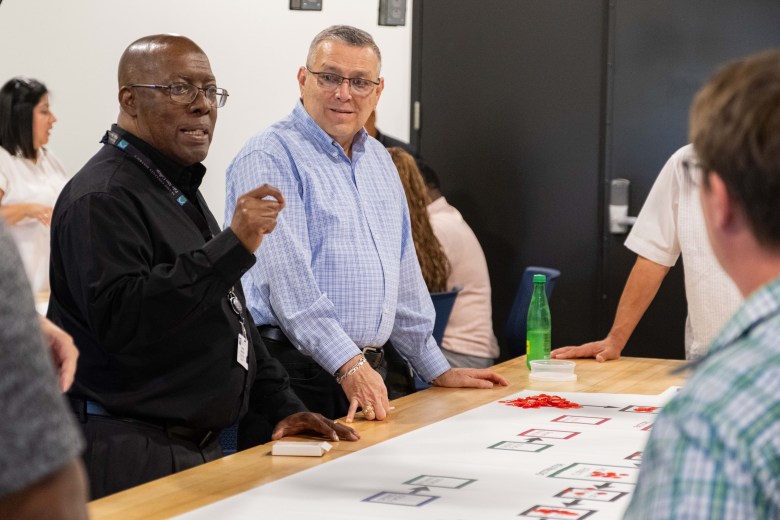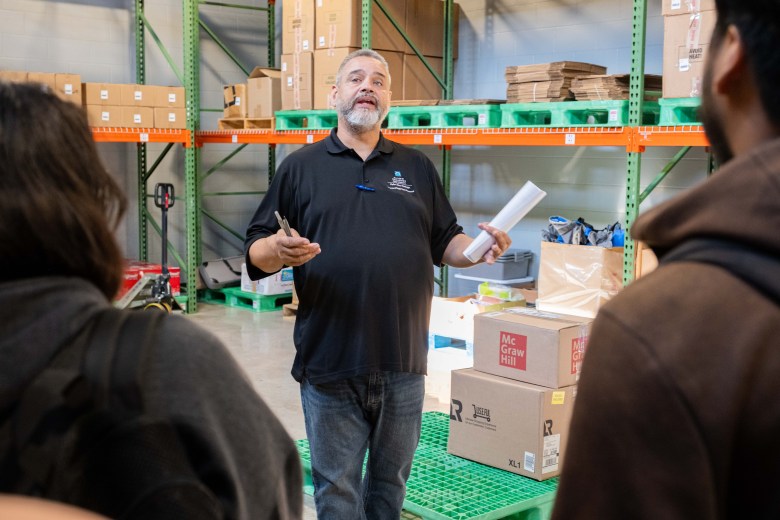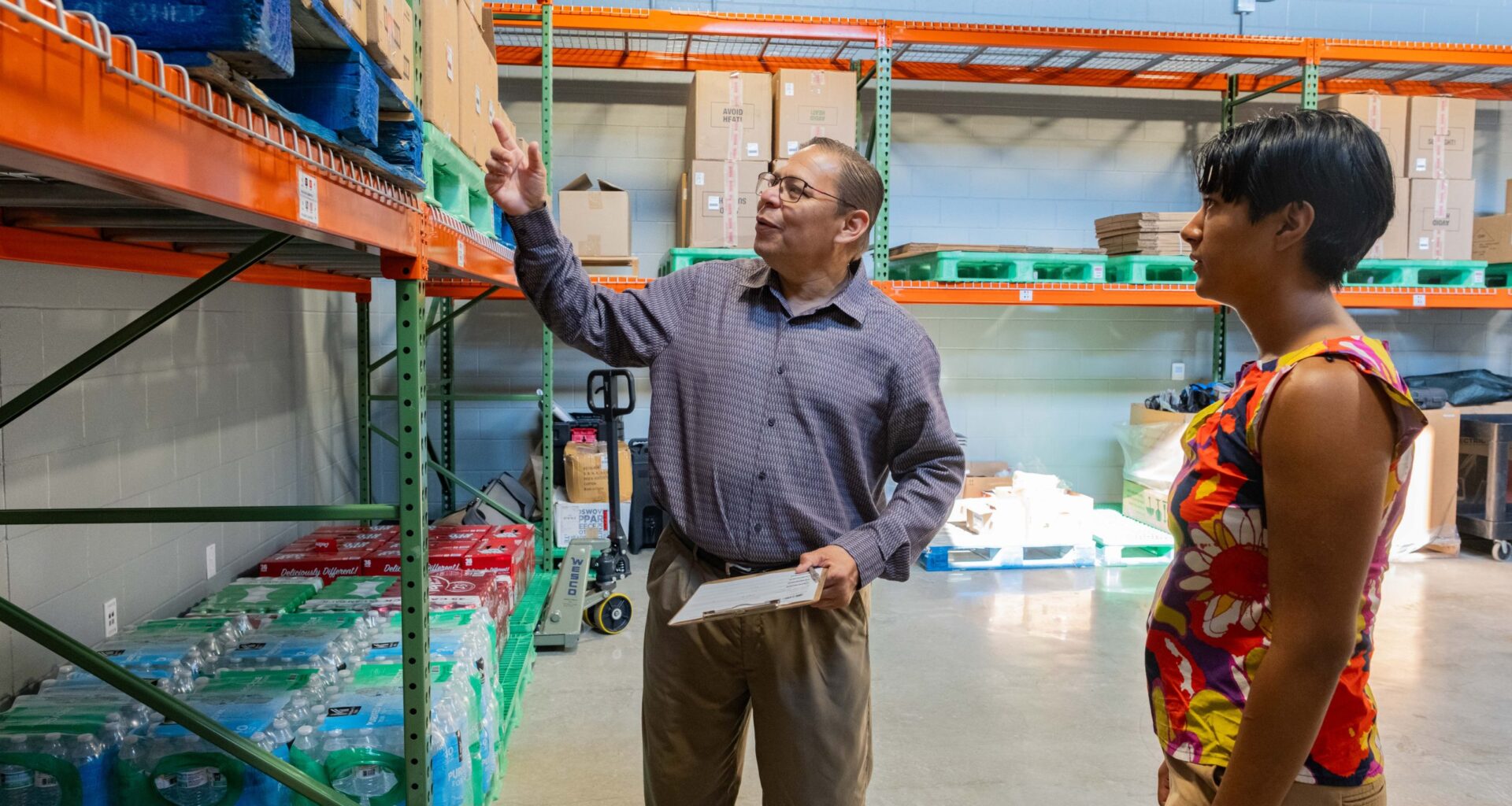Before the coronavirus pandemic, the average consumer didn’t have enough of a reason to learn about how goods made it into their shopping carts.
Palo Alto College President Robert Garza thanks the sudden shortage of toilet paper for shining a light on the importance of having well-trained staff able to respond, assess and get in front of huge shifts in consumer demand.
Earlier this week, the college celebrated the opening of its brand-new Global Logistics Lab. The lab aims to help students experience what goes on behind the scenes and how their decisions can impact the supply chain.
“Ten years ago, not everybody knew about supply-chain management and logistics,” Garza said. “But after COVID, (people) were finding out very quickly… companies and industries are still trying to navigate, and they need this talent.”
The process in which materials and goods get from a factory, to a distributor, to a retailer and eventually the customer’s hands, is something that Ronnie Brannon described as not immediately appealing, but an impactful and fulfilling career for his students.
 Lead logistics instructor Ronnie Brannon, left, and logistics and supply chain management student Rodney Gomez guide students through a supply chain game to simulate supply chain situations in the S.T.E.M. Maker Space at Palo Alto College on Wednesday. Credit: Amber Esparza / San Antonio Report
Lead logistics instructor Ronnie Brannon, left, and logistics and supply chain management student Rodney Gomez guide students through a supply chain game to simulate supply chain situations in the S.T.E.M. Maker Space at Palo Alto College on Wednesday. Credit: Amber Esparza / San Antonio Report
“What I want for the individuals that are coming into this program and the individuals that haven’t chosen logistics (is for them) to say, ‘Hey, I want a career field that I can be so passionate about. I just can’t wait to get to it because I know I’m making a difference,’” Brannon said.
Brannon is acting program lead at the community college located on the South Side of San Antonio.
Garza says the more experience and certifications they can add, the more high-value jobs they can line up for their students. The college currently offers an associate degree in applied science in logistics and supply chain management through which students also earn certificates in logistics, supply chain management, transportation management, and warehouse management.
Students can transfer credits earned at Palo Alto to Wayland Baptist University in Plainview to work their way toward a bachelor of applied science in logistics and supply chain. The classes are available online.
The Global Logistics Lab includes a classroom where students in this program will have the opportunity to gather, considering the courses are taught fully online. There’s also a small warehouse where they get to experience first hand the inventory process.
Brannon and his team also secured a partnership with Special Olympics Texas to provide consulting advice, which will be developed by their students.
“Here, through the Global Logistics Lab, Mr. Brannon’s getting his students to work here, get hands-on experience, add it to your resume,” said Jeff Schnoor, a student in the Palo Alto Logistics program. “And you have the experience, you have the ability to do the job. And that’s what they’re looking for.”
Like many students in this program, Schnoor, 50, chose logistics as a change of career after spending 22 years as a counselor and having earned a PhD. He is now on his way to earn an associate’s degree in logistics, and has already acquired five certifications in the field.
“I quit counseling and came back to retrain and become a warehouse and transportation manager,” Schnoor said. “I’m also on their competition team and compete nationwide against four-year colleges. We’re the only two-year college (competing) on how to set up a warehouse and how to operate.”
 Logistics and operations management student Jeff Schnoor gives a demonstration at Palo Alto College’s new global logistics lab on Wednesday. Credit: Amber Esparza / San Antonio Report
Logistics and operations management student Jeff Schnoor gives a demonstration at Palo Alto College’s new global logistics lab on Wednesday. Credit: Amber Esparza / San Antonio Report
Brannon took over the logistics program in 2010, he said, with the goal of elevating it to become recognized as a go-to for industry looking for qualified workforce. Demand for the program grew amid the pandemic and more companies looked for qualified candidates to fill key positions in their warehouses, he said.
“We added case studies in our classes because we wanted to develop critical thinking and make sure that our students were industry ready,” Brannon said. “And we started to get nationally recognized in 2022 as one of the best logistics and supply chain programs in the country that had a total online program.”
The Global Logistics Lab will also open the door to local businesses owners to get the consultation help that they might not be able to afford through a large firm.
This will not only help the business, but Brannon says it can also bring more attention to the impact of this program and their student’s skills.
Consultations for local businesses will be free, Brannon said, but business owners are also encouraged to invest in the program through grants or gifts that could allow them to put more money into the equipment that students get access to at the lab.
“One of the things that I hear from the schools is that logistics is not sexy,” Brannon said. “Now, we’re getting (Virtual Reality) goggles that students can play with… and they can now see that ‘Wow, this is what they’re doing in a warehouse.’ Because they don’t know. They don’t know unless their parents or relatives work in a warehouse.”
